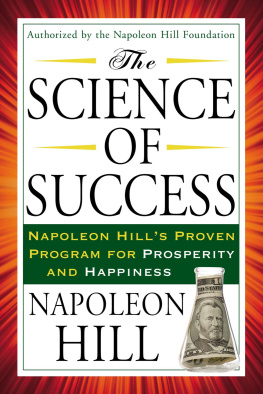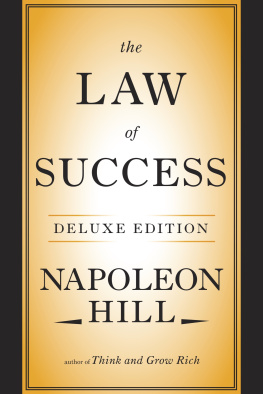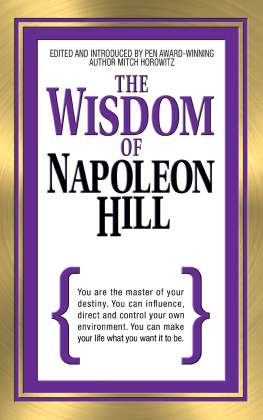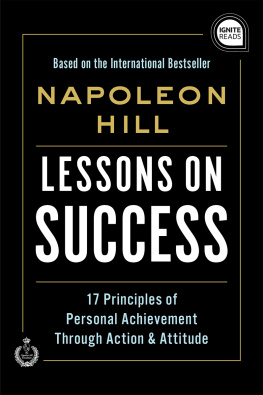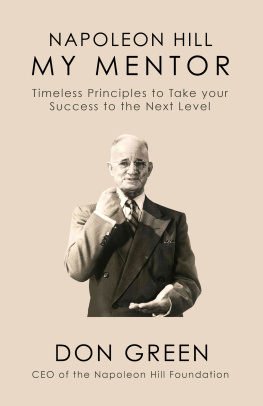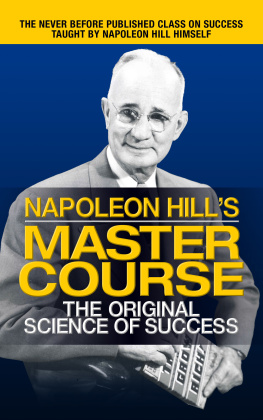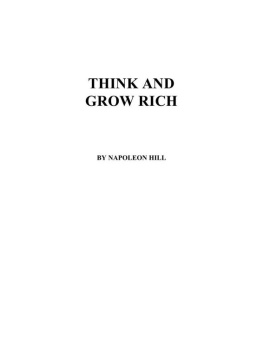Penguin supports copyright. Copyright fuels creativity, encourages diverse voices, promotes free speech, and creates a vibrant culture. Thank you for buying an authorized edition of this book and for complying with copyright laws by not reproducing, scanning, or distributing any part of it in any form without permission. You are supporting writers and allowing Penguin to continue to publish books for every reader.
Tarcher and Perigee are registered trademarks, and the colophon is a trademark of Penguin Random House LLC.
FOREWORD
By Don M. Green,
Executive Director, The Napoleon Hill Foundation
A s a young reporter working for Bob Taylors Magazine in 1908, Napoleon Hill conducted his first major interview at the home of steel magnate Andrew Carnegie. As many followers of Napoleon Hills life and writings know, Carnegie asked young Napoleon to spend the next twenty years or so, without pay, conducting interviews so that he could write the first book in America on how its great men had achieved success.
Napoleon accepted the challenge, did the necessary research and interviews, and produced the first major treatise on the science of personal achievement. Published in 1928 as Law of Success, it was followed in 1937 by an abbreviated version, titled Think and Grow Rich, which is without a doubt the most read and most valued motivational book of the 20th Century, and thereafter.
The Napoleon Hill Foundation, founded by Mr. Hill in 1962, eight years before his death, continues to promote his philosophy. It has licensed his books in over fifty languages throughout the world. It is a non-profit charitable foundation which uses its revenues to endow scholarships, teach Hills principles in correctional institutions, and conduct research into his life and work. It has recently unearthed three unpublished full-length books by Mr. Hill, one of which, Outwitting the Devil, was published in 2011 to critical acclaim.
The book you are about to read is excerpted from a series of lessons on success that Napoleon Hill wrote in 1941 at the urging of Dr. William Plumer Jacobs of Clinton, South Carolina. Dr. Jacobs was president of Presbyterian College, owner of Jacobs Press, and consultant to many textile mill owners. He had heard Mr. Hill lecture a year earlier, was impressed, and believed that a self-help course and lecture series by Mr. Hill would help South Carolina and its neighboring states emerge from the lingering effects of the Great Depression. Believing that many Americans were still beaten down by the hard times of the 1930s, and were depending too much on the government for economic support, Mr. Hill saw this opportunity to teach people how to succeed.
Napoleon accepted Dr. Jacobs offer and moved to Clinton to write his lessons on success. He called the lessons Mental Dynamite, taking the title from an observation Mr. Carnegie made when they first met: The power with which we think is mental dynamite. He authored seventeen lessons, in booklet format, and each based on one of the principles of success he had discovered in his discussions with Mr. Carnegie and other men of achievement. Most of the lessons included lengthy excerpts from Napoleons interviews with Mr. Carnegie, and then set forth specific examples of how Mr. Carnegies principles had been applied by other successful people in America.
Mr. Hills Mental Dynamite booklets and lecture series were well received, but everything changed on December 7 of the year of their publication, when Japan bombed Pearl Harbor and the United States entered World War II. These Mental Dynamite lessons were put aside during the War, and largely forgotten thereafter. In this book, the Foundation has put together three of the lessons, which focus on what many people think are the most important of all of Hill and Carnegies principles.
The Mental Dynamite lessons chosen for this book are those that anyone can use to achieve personal power. More importantly, they must be used in order to achieve personal power. The principles are Definiteness of Purpose, the Mastermind Principle, and Going the Extra Mile. As these lessons from the Foundations archives are read, and more importantly applied, you will begin your journey on the path to personal power.
THINK!
Croesus, a wise philosopher and confidential advisor to Cyrus, king of the Persians, said:
I am reminded, O king, that
there is a Wheel on which
the affairs of men revolve,
and its mechanism is such
that it prevents any man
from being always fortunate.
There is a Wheel of Life that controls the destiny of men. It operates through the minds of men, through the power of thought. The Philosophy of Individual Achievement set forth in Mental Dynamite was designed for the purpose of aiding men in the mastery and control of this great wheel, to the end that it may yield them an abundance of all they desire or need and bring enduring happiness. Remember, you who are beginning the study of this philosophy, that this same wheel which prevents any man from being always fortunate, provides, also, that no man shall be always unfortunate, if he will take possession of his mind and use it.
THE AUTHOR
CHAPTER ONE
DEFINITENESS of PURPOSE
T hrough the lessons of this book you will be provided with usable knowledge that would cost you a huge fortune if you acquired it, as it was originally organized, from the minds of Andrew Carnegie and more than five hundred other distinguished leaders in American business and industry. Among the persons whose successful experience is published here are Henry Ford, Thomas A. Edison, Stuart Austin Wier, Cyrus H. K. Curtis, Edward Bok, Dr. Alexander Graham Bell, Dr. Elmer R. Gates, John Wanamaker, James J. Hill, Edwin C. Barnes, William Howard Taft, Charles M. Schwab, Theodore Roosevelt, Elbert H. Gary, Charles P. Steinmetz, and Woodrow Wilson.
For all practical purposes you may assume that you are now entering a classroom in which your teachers will consist of more than five hundred of the men who have made America the richest and freest country known to civilization. Moreover, you will be privileged to acquire in this book the same knowledge that would have required over ten years of intense study had you procured it from its original source.
Through this book you will be schooled in an entire philosophy of success, complete and adequate in every respect for the needs of any person seeking the privilege of self-determination under the great American system of personal advancement. You will receive instruction that is not available at any price nor under any circumstances through any other source.
These lessons have been presented in a manner best suited to enable you to assimilate the knowledge they convey, with no effort on your part beyond a sincere desire to avail yourself of the secrets of achievement which are known to have been the foundation of almost all of the successful business leaders this country has produced.


